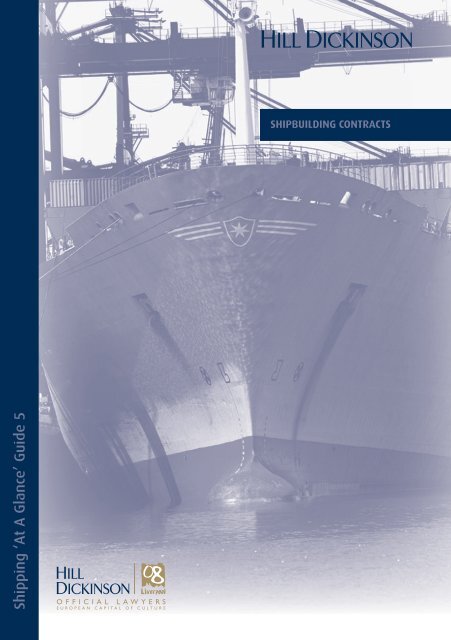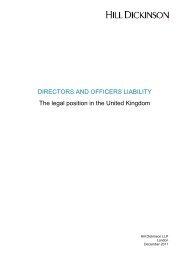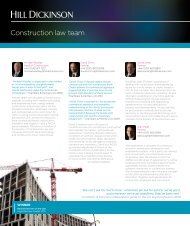Shipbuilding Contracts - Hill Dickinson
Shipbuilding Contracts - Hill Dickinson
Shipbuilding Contracts - Hill Dickinson
Create successful ePaper yourself
Turn your PDF publications into a flip-book with our unique Google optimized e-Paper software.
Shipping ‘At A Glance’ Guide 5<br />
SHIPBUILDING CONTRACTS
<strong>Shipbuilding</strong> <strong>Contracts</strong><br />
Contents<br />
Section:<br />
Page No.<br />
Introduction 2<br />
1. Form 2<br />
2. Specification 3<br />
3. Contract Price 4<br />
4. Payments 5<br />
5. Sub Contracting 5<br />
6. Liquidated Damages provisions 6<br />
7. Title & Risk 8<br />
8. Security 9<br />
9. Ship's Classification 10<br />
10. Trials 11<br />
11. Documentation and Delivery 11<br />
12. Warranty Period 13<br />
13. Default by the Buyer 14<br />
14. Default by the Builder 15<br />
15. Dispute Resolution 16<br />
www.htd-law.com<br />
Whilst care has been taken in the preparation of this guide, the matters referred to herein are subject to change and<br />
no liability or responsibility is accepted by anyone for any errors or omissions which may exist in it.<br />
The contents of this booklet are descriptive only and should not be used as a substitute for legal advice.
Introduction<br />
This firm has extensive experience of new building arrangements and reviewing the documentation and<br />
financing arrangements that are likely to be required in relation thereto whatever the type of vessel<br />
involved, whether it be a cargo carrier, passenger vessel or luxury mega-yacht. We believe, therefore that<br />
we are well placed to provide owners and shipyards with all the necessary legal assistance required<br />
when <strong>Shipbuilding</strong> <strong>Contracts</strong> are being entered into.<br />
Accordingly, we have produced this guide in order to provide clients with an indication of the main<br />
issues that will need to be considered in any negotiations between a Buyer and its selected Builder (or<br />
as part of any tender process that is undertaken) and to provide an idea of the type of terms that are<br />
commonly agreed.<br />
In our experience, given the competing interests of Buyer and Builder and potential for unforeseen<br />
circumstances to delay or cause difficulties with the build the likelihood of dispute becomes almost<br />
inevitable if these issues are not addressed and dealt with in a properly negotiated and documented<br />
contract so that the rights and obligations of each party and the risks that they are to bear are clear.<br />
Without such a process, expensive legal proceedings and delays to delivery are often the result. With it<br />
the likelihood of such disputes can usually be minimised.<br />
1. Form<br />
As with any contract, the parties should aim to reach agreement on each of the main commercial issues<br />
before formal contractual documentation is prepared (possibly by the Buyer and Builder entering into<br />
a non-binding form of letter of intent). Unless there is a requirement or an opportunity to have a specific<br />
shipbuilding contract prepared to send to the proposed Builders, which is more common where the<br />
design role is being dealt with separately, or where there will be a sophisticated tender process (where<br />
tenders may be ranked in part according to the number of non-conformities with these standard terms<br />
that they give notice of) then it is normal for the Builder to produce the first draft of the contract.<br />
However, the Buyer will wish to review the same extensively to achieve a balanced contract that contains<br />
all the Buyer’s reasonable requirements. This will be especially important for a Buyer where standard<br />
forms (such as AWES or SAJ) are used since these will generally be favourable to the Builder.<br />
2
<strong>Shipbuilding</strong> <strong>Contracts</strong><br />
2. Specification<br />
Agreement of a detailed specification for the ship will be one of the most important and earliest issues<br />
to address. It is of particular relevance if the ship is of a non-standard design with particular<br />
requirements in terms of its technical capability and performance with which Builders may not be<br />
familiar.<br />
Unless such expertise is available in-house the Buyer would normally select a technical adviser to advise<br />
it in relation to the specification required and to negotiate and agree the detailed specification with the<br />
Builder (acting on the instructions it has received from the Buyer). The specification should also detail<br />
the spares and other equipment to be provided with the ship. The lawyers involved would also aim to<br />
identify those areas of the specification where problems might arise in the hope that such problems can<br />
be dealt with and minimised where possible. The <strong>Shipbuilding</strong> Contract would also need to specify the<br />
authority of these advisers to approve relevant plans and drawings and their rights to inspect and<br />
oversee the various works and how any technical disputes are to be resolved. Ownership of any designs<br />
may also need to be dealt with.<br />
In addition to technical issues, other matters that are likely to affect the specification are as follows:<br />
(a)<br />
intended use of the ship (i.e. commercial or non-commercial)<br />
(b)<br />
trading patterns<br />
(c)<br />
Classification required and Classification Society appointed<br />
(d)<br />
choice of flag and flag state requirements<br />
The ultimate objective is for a detailed specification to be agreed and to form part of the <strong>Shipbuilding</strong><br />
Contract (usually by way of a schedule thereto) although in the event of any inconsistencies between the<br />
agreed specification and the <strong>Shipbuilding</strong> Contract the latter will normally prevail.<br />
3
3. Contract Price<br />
The purchase price will be another of the main commercial issues to be agreed both as to the overall<br />
amount and as to the stages at which this will be paid.<br />
In most commercial arrangements the price agreed will be fixed and the Builder will bear the risk of any<br />
increased costs of construction. Agreements for the Builder to receive its costs plus a fixed level of profit<br />
are rare but may be appropriate for some government contracts or development projects. Nevertheless,<br />
it is possible that in volatile conditions a Builder may seek provision for the price to be varied in certain<br />
circumstances, which might include:<br />
(a)<br />
changes to take account of variation in the cost of core construction materials (such as the<br />
price of steel); and<br />
(b)<br />
changes to take account of variations to exchange rates. This may particularly be the case for<br />
European or Far Eastern yards which quote prices in US Dollars but whose expenses are likely to be<br />
incurred in local currency.<br />
In such cases alternative methods of dealing with these risks may need to be explored (e.g. by hedging<br />
in the financial markets). Buyers should also be anxious to ensure that any variation clauses of this<br />
nature operate in both directions (and will reduce the price where there is a variation which is<br />
favourable to the Builder) and are also subject to some limits (so a maximum price can be specified).<br />
It would also be normal for provisions to be included in the contract to deal with any price adjustments<br />
that may result from a change in specification. Such changes (and the resulting price adjustments) are<br />
a common cause of dispute so it is desirable to agree a detailed specification from the outset in order<br />
to minimise any requirement for the same. However, such variations cannot always be avoided. For<br />
the Buyer it will be desirable that where variations become necessary the <strong>Shipbuilding</strong> Contract<br />
imposes an obligation on the Builder to give effect to the variations even if appropriate adjustments<br />
to price and the delivery schedule cannot be agreed (and need to be determined by an arbitrator)<br />
although the Builder may often resist an obligation of this type. The Buyer may also wish to have an<br />
express right to seek a waiver of any mandatory requirements so that it has an opportunity to lobby<br />
any relevant authority if it believes it has a case for avoiding the same.<br />
4
<strong>Shipbuilding</strong> <strong>Contracts</strong><br />
4. Payments<br />
In most cases the first instalment of the purchase price will be payable before construction starts once<br />
the Builder’s Refund Guarantee has been issued. Subsequent instalments will then become due<br />
following completion of particular stages of construction with a final instalment due on delivery.<br />
Normally, completion of a stage of construction (i.e. keel laying, hull completion and launching) would<br />
be confirmed by a classification society surveyor (and the society’s certificate of completion would<br />
trigger payment). One alternative to this is to provide for pre-delivery instalments to be paid on<br />
particular dates regardless of the stage of construction reached.<br />
Whichever structure is used, Builders will look to maximise the upfront payments and reduce the<br />
amount payable on delivery (which will be subject to the ship successfully completing trials etc) whereas<br />
Buyers prefer to defer as much of the price as possible until delivery to minimise the effects of default<br />
and costs of capital.<br />
Accordingly, the final payment schedule will be the result of commercial negotiation although any Buyer<br />
that has cash available (and may be funding the purchase of the ship either partly or wholly in cash)<br />
may be willing (to a limited extent) to accept larger upfront payments in return for stricter penalties for<br />
delays in delivery etc.<br />
A Builder will also be anxious to ensure that the <strong>Shipbuilding</strong> Contract contains appropriate provision<br />
for any non-payment. This is likely to include a right to suspend any works and a right to receive interest<br />
where payment is delayed and a right to cancel the <strong>Shipbuilding</strong> Contract in the event of any extended<br />
delay. In certain circumstances a Builder may also require a parent company or bank guarantee in<br />
respect of the payment obligations of the Buyer.<br />
5. Sub-Contracting<br />
The right to sub-contract certain of the works is likely to be sought by a Builder and, although in certain<br />
circumstances there may be reasons to resist this, it will often be necessary in order to meet a delivery<br />
deadline or because of constraints caused by the price agreed. It is also possible that sub-contractors<br />
will be required for certain technical aspects of the construction because they have expertise not<br />
possessed by the Builder (e.g. for navigation systems, lifting equipment etc).<br />
5
Where sub-contractors are to be used the Buyer will normally wish to ensure that-<br />
(a)<br />
it has a right of approval over any material sub-contractors that are used (since these are likely<br />
to be known in advance the contract will often specify approved sub-contractors);<br />
(b)<br />
the terms of each sub-contract will be made available to it and the Builder will be under an<br />
obligation to ensure that the same are consistent with the terms of the <strong>Shipbuilding</strong> Contract;<br />
(c)<br />
the benefit of the sub-contracts can be assigned to the Buyer following any termination of the<br />
<strong>Shipbuilding</strong> Contract should the Buyer wish to take over and complete the ship;<br />
(d)<br />
any sub-contractors are prevented from claiming any lien over the ship or retention of title<br />
over any goods supplied to the Builder; and<br />
(e)<br />
the Builder obtains guarantees and warranties from the sub-contractors which allow the<br />
Builder to give the required warranties to the Buyer.<br />
In each case the Buyer will also be looking for the Builder to continue to be wholly liable to the Builder<br />
in relation to any works that a sub-contractor may carry out.<br />
6. Liquidated Damages Provisions<br />
Any <strong>Shipbuilding</strong> Contract will, almost without exception, include a liquidated damages provision<br />
setting out the agreed damages payable to the Buyer as a result of any delay in delivery of the ship or<br />
as a result of its failure to comply with certain aspects of the specification. For cargo vessels these might<br />
include failure to comply with warranted speed, fuel consumption, deadweight and cargo capacity and<br />
for passenger vessels, levels of noise and vibration may also be included. The inclusion of such a clause<br />
is generally to be recommended and has advantages for both parties as it means that:<br />
(a)<br />
the Buyer will not be required to prove its loss in order to claim the liquidated damages<br />
referred to; and<br />
(b)<br />
the Builder will not be liable for unlimited losses which it will not be able to quantify or<br />
insure against.<br />
6
<strong>Shipbuilding</strong> <strong>Contracts</strong><br />
Under English law to prevent a liquidated damages provision of this nature being unenforceable as a<br />
penalty clause the liquidated damages agreed must be a genuine pre-estimate of the losses that would<br />
be suffered as a result of the delay or failure to meet specification. However, since these clauses are<br />
normally the subject of extensive and often protracted negotiations it will not usually be difficult to<br />
demonstrate this. Accordingly, it is difficult to avoid the terms or effect of any liquidated damages<br />
provision which is agreed even if the payments provided for do not in fact correspond to the loss or<br />
damage actually suffered. A Buyer will need to get its technical advisers involved in these negotiations<br />
and will be seeking to ensure that there are suitable incentives for the Builder to comply with<br />
specification and meet the required delivery date. In contrast the Builder will obviously be seeking to<br />
minimise the liquidated damages as much as possible.<br />
Some common features of these clauses are as follows (although the inclusion of terms of this nature<br />
and their exact terms will depend on the relative bargaining power of the parties):<br />
(c)<br />
An allowance for a limited period of delay in delivery where no damages will accrue. This<br />
period should be agreed in the context of the duration of the build.<br />
(d)<br />
An allowance for permitted delays due to changes in the specification or events of force<br />
majeure. For these purposes the Buyer will be seeking to ensure restricted definitions of “force<br />
majeure” and “permitted delays” so that the Builder cannot claim unjustified delays or delays<br />
due to its own default.<br />
(e)<br />
Liquidated damages for delay which bear some relation to the cost of chartering<br />
replacement tonnage.<br />
(f)<br />
Allowances for other failures to meet specification without damages. Again these will be<br />
subject to negotiation but should be fairly minimal.<br />
(g)<br />
Rights for the Buyer to cancel the <strong>Shipbuilding</strong> Contract and receive a refund of all pre-delivery<br />
instalments paid for extended delays or excessive deficiencies in specification. For example, a<br />
Buyer might seek a right to cancel after a delay of say 210 days.<br />
(h)<br />
Overall limits on the aggregate liquidated damages payable. This will normally be expressed as<br />
a percentage of the purchase price. Any such limit should also not affect any right of<br />
cancellation the Buyer may have.<br />
7
7. Title & Risk<br />
Title to the completed ship should obviously pass to Buyer upon completion and payment of the<br />
delivery instalment (unless a form of lease finance is being used in which case the Buyer may need to<br />
have title to the ship passed direct to the leasing company and arrangements for a novation of the<br />
<strong>Shipbuilding</strong> Contract to the leasing company may be necessary).<br />
In addition the <strong>Shipbuilding</strong> Contract should also specify who will have title to the ship during the<br />
course of its construction. There are two possibilities:-<br />
Either that title to the ship will remain vested in the Builder until delivery and payment in full of the<br />
purchase price; or<br />
title to the ship will pass to the Buyer during the course of construction as and when the ship is<br />
constructed subject to a lien in favour of the Builder until the purchase price is paid.<br />
A provision of the former nature should increase the Buyer’s security if the Builder were to get into<br />
financial difficulties or be in default under the <strong>Shipbuilding</strong> Contract and would be of assistance in any<br />
situation where the ship needed to be removed from the Builder (or any sub-contractor’s) premises for<br />
completion elsewhere. However, any attempt at repossession/relocation of the ship (whatever the<br />
circumstances) is unlikely to be straightforward and may be subject to various provisions of local law<br />
(although, in the event of any Builder’s default recourse under the Refund Guarantee should still be<br />
available as an alternative remedy). In certain cases the Builder may also be prevented from passing title<br />
to the ship to the Buyer during construction as it will be required to give security over the same to its<br />
bankers to raise finance for the costs of constructing the ship.<br />
The <strong>Shipbuilding</strong> Contract should also require the Builder to maintain insurance against any loss or<br />
damage to the ship during the course of its construction. Normally, the Buyer will also want a right to<br />
approve the insurance arrangements in order to ensure that such insurance is on the standard “Builder’s<br />
Risks” terms available in the London Market and that where necessary the insurance cover extends to the<br />
negligence or wilful damage of the Builder’s employees and agents and war risks. The amount of<br />
insurance cover obtained will also need to be no less than the aggregate amount of instalments paid<br />
together with the value of any Buyer’s supplies (which should also be covered). The <strong>Shipbuilding</strong> Contract<br />
should also specify that in the event of a total loss of the ship prior to delivery the Buyer shall have the<br />
option either:-<br />
8
<strong>Shipbuilding</strong> <strong>Contracts</strong><br />
The <strong>Shipbuilding</strong> Contract should also specify that in the event of a total loss of the ship prior to delivery<br />
the Buyer shall have the option either:<br />
(i)<br />
to cancel the <strong>Shipbuilding</strong> Contract and receive a refund of all pre-delivery instalments; or<br />
(ii)<br />
to require the Builder to recommence construction of the ship and to apply the insurance<br />
proceeds towards the cost thereof.<br />
However, Builders will often resist this later provision and even if it is included it will normally be<br />
dependant on new delivery schedules and any variation to the price being agreed.<br />
8. Security<br />
In order to provide the Buyer with security it will also be important for it to obtain a Refund Guarantee<br />
pursuant to which a bank (acceptable to the Buyer) will guarantee the repayment by the Builder of any<br />
money that becomes due under the <strong>Shipbuilding</strong> Contract upon any premature termination thereof (e.g.<br />
any instalments that are to be repaid as a result of a termination of the <strong>Shipbuilding</strong> Contract due to<br />
the Builder’s default, including if the Builder runs into financial difficulties or following a total loss, or<br />
any penalty payments due which are not deducted from the final purchase price). Accordingly, agreeing<br />
the identity of this bank and the terms of the Refund Guarantee will be an important part of the<br />
negotiation process. The Parties should note the following points when agreeing the terms of the same:<br />
(a)<br />
The Builder and its bank will usually insist upon a cap of liability under the Refund Guarantee.<br />
This would normally be for the amount of all paid pre-delivery instalments plus interest.<br />
(b)<br />
Where the Buyer obtains some security through ownership of the Vessel during the course of<br />
her construction the Builder might argue that the Refund Guarantee should only cover the<br />
earlier pre-delivery instalments and not all of them. However, since this “security” is often<br />
difficult to rely on requests of this nature should normally be resisted.<br />
(c)<br />
The procedure for paying claims under the Refund Guarantee should also be agreed. Ideally,<br />
the Buyer will be seeking a form of on-demand guarantee whereby the relevant bank is<br />
required to pay upon receipt of a demand (complying with the terms of the guarantee)<br />
regardless of whether or not the Buyer has established that it is entitled to the refund at law.<br />
The alternative is for the guarantee to provide that in the event of a dispute no payment will<br />
be made until the dispute has been settled or determined in accordance with the <strong>Shipbuilding</strong><br />
Contract (e.g. by expert determination, arbitration or through the courts). In these<br />
circumstances the Buyer needs to ensure that any date of expiry referred to in the Refund<br />
Guarantee is extended to allow for the dispute resolution procedure to be completed.<br />
9
(d)<br />
A Buyer would normally wish to have a right of approval over the identity of the bank giving<br />
the Refund Guarantee and where a series of newbuildings is being ordered may wish to specify<br />
that more than one bank is involved. In these circumstances the Buyer should also require<br />
some provision that would allow it to withdraw its approval of any bank where there has been<br />
a material deterioration in the bank’s financial condition before the Refund Guarantee is<br />
issued. Normally, this would be done by reference to a change to the bank’s credit rating.<br />
(e)<br />
The Buyer, in turn, may be required to provide a Performance Guarantee from a bank<br />
acceptable to the Builder guaranteeing the performance by the Buyer of its various payment<br />
obligations under the <strong>Shipbuilding</strong> Contract. Such a guarantee would normally depend upon<br />
the Builder’s claim to such instalments being established rather than being of an on demand<br />
nature. The requirement for such a guarantee will obviously also depend on the financial<br />
standing of the Buyer. For larger corporations a guarantee may not be required or a parent<br />
company guarantee of the obligations of a subsidiary may be accepted. Where there are<br />
concerns over the financial standing of a Buyer, a Builder may also agree to forego a guarantee<br />
if the instalments are weighted so that more is paid in advance of delivery to reduce the<br />
Builder’s exposure to unrecoverable costs.<br />
9. Ship’s Classification<br />
A Classification Society acceptable to the Buyer should be utilised and the exact class notation<br />
required should be clearly set out as part of the specification. The Builder normally covers the costs<br />
of the Classification Society during construction and, accordingly, the <strong>Shipbuilding</strong> Contract should<br />
not normally provide for the Buyer to pay for the same. Any other specific rules or regulations which<br />
the Buyer requires the Ship to comply with should also be identified and referred to. The place of<br />
registration also has to be identified and the ship built in accordance with the laws, rules and<br />
regulations applicable thereto. As referred to above a Classification Society surveyor will also be<br />
involved in confirming the completion of the various stages of construction for the purposes of stage<br />
payments and in the trials procedure referred to below. Reference to the Classification Society<br />
surveyor may also be made to resolve disputes regarding class or which are of a technical nature.<br />
10
<strong>Shipbuilding</strong> <strong>Contracts</strong><br />
10. Trials<br />
The specification also normally sets out the trials to be carried out following construction and the<br />
conditions in which such trials are effected in order to ascertain whether or not the ship as constructed<br />
complies with the specification. It should also contain the methods of measurement to be utilised in<br />
such trials and in particular the programme of sea trials which will carried out to determine whether<br />
the ship complies with the various aspect of specification in respect of which liquidated damages will<br />
be payable.<br />
It will normally be in the Buyer’s interests to ensure that any <strong>Shipbuilding</strong> Contract provides for the<br />
following in relation to such trials:<br />
(a)<br />
A procedure for the Buyer to receive reasonable notice of such trials since provided due notice<br />
is given the Builder will normally be entitled to proceed with the trials and the trials shall be<br />
conclusive even if the representatives of the Buyer are not in attendance to witness the same.<br />
(b)<br />
A requirement for a representative of the Classification Society to attend and certify the results<br />
of the trials with such certification normally being binding on the parties in the event of<br />
any dispute<br />
(c)<br />
Allowance in the trial results to be made for any unduly favourable conditions as well as<br />
unfavourable conditions.<br />
(d)<br />
No provision for there to be a “permitted delay” or an extension to the delivery date if the<br />
trials need to be repeated (with the result that the Builder will normally have an unrestricted<br />
right to repeat trials).<br />
(e)<br />
Appropriate provision for the Buyer to invite guests to the trials (e.g. such as potential<br />
charterers) in addition to its own representatives.<br />
11. Documentation and Delivery<br />
The <strong>Shipbuilding</strong> Contract will need to specify both the procedure for delivery of the ship and the<br />
documentation that will be provided by the Builder upon delivery in exchange for the final instalment<br />
of the purchase price.<br />
11
The Builder will normally be anxious to effect delivery as soon as possible after the trials have been<br />
satisfactorily completed and the Buyer will normally only have a limited time (probably up to 5 days) to<br />
pay the delivery instalment once the ship has been tendered for delivery. Accordingly, there is nothing<br />
to prevent the Builder delivering the ship early should it be able and wish to do so. For this reason the<br />
contract should also require the Builder to give the Buyer regular notice of the anticipated delivery date.<br />
The Buyer may also wish to resist any provision which provides for the purchase price to be increased as<br />
a result of an early delivery, unless this has been achieved at its specific request.<br />
The place of delivery must also be agreed. Normally, this will be at the Builder’s yard although the Buyer<br />
may be able to negotiate delivery at a location which is more convenient for the Buyer (e.g. in terms of<br />
crewing and the ships intended trading routes).<br />
On delivery the Buyer should receive some or all of the following documents:-<br />
(a)<br />
a document of title to the ship. This will either be a Builder’s Certificate or Bill of Sale<br />
confirming that title to the ship has passed from the Builder to the Buyer. This will need to be in a<br />
form which is acceptable to the authorities of the ship’s intended flag and should refer to title to<br />
the ship being transferred free from all encumbrances;<br />
(b)<br />
an inventory of all equipment supplied with the ship including any spare parts (as provided for<br />
in the specification);<br />
(c)<br />
all relevant trading and classification certificates (which will include all tonnage, loadline and<br />
other safety certificates and the confirmation of class as provided for in the specification).<br />
Where any of these certificates are not available or are only available on a provisional basis the<br />
Buyer might agree to take delivery if the Builder agrees to provide the certificates within a<br />
particular date;<br />
(d)<br />
where a warranty guarantee is being provided the original of that guarantee;<br />
(e)<br />
an inventory of consumables stores with which the ship has been supplied. This will include<br />
any bunkers and lubricating oils remaining onboard the ship at delivery as the contract will<br />
normally specify the Buyer shall pay for these in addition to the purchase price;<br />
(f)<br />
commercial invoices in respect of purchase price and the cost of any additional bunkers or<br />
stores paid for;<br />
12
<strong>Shipbuilding</strong> <strong>Contracts</strong><br />
(g)<br />
Such additional documents as the Buyer may reasonably require in order to effect registration<br />
of the ship on the relevant flag.<br />
In order to ensure that these documents are in an appropriate form it is prudent for drafts of these<br />
documents to be produced by the Builder and approved by the Buyer in advance of delivery.<br />
12. Warranty Period<br />
It is normal for the Builder to guarantee the materials and workmanship used in the construction of the<br />
ship and its appurtenances, components, engines, machinery, equipment and spare parts for a period<br />
of at least 12 months from delivery. Although this period may appear relatively short in respect of an<br />
asset which should have a useful life of 20-30 years, after the warranty period the Buyer may have<br />
alternative recourse to its insurers in respect of any defects depending on its insurance coverage.<br />
The exact terms of the warranty provision will need to be considered carefully and are likely to be the<br />
subject of extensive negotiation. The following are some issues that will, in particular, need to be<br />
covered:<br />
(a)<br />
The procedure for making warranty claims and how any disputes will be dealt with. A common<br />
provision is for the parties to agree that a guarantee engineer employed and paid for by the<br />
Builder will be placed on the ship for some or all of the warranty period so that (where<br />
possible) he can deal with any claims made by the Buyer or where he is unable to do so<br />
authorise further remedial works).<br />
(b)<br />
How and where any further remedial works that cannot be carried out by the guarantee<br />
engineer will be effected. The Buyer will need to have an ability to carry out temporary repairs<br />
in the event of any emergency. For other repairs the Buyer will also normally wish to have a<br />
right to have repairs effected at a port near to the ship when the defects are detected so that<br />
any interruption to the ship’s itinerary can be minimised. In such cases the Buyer would also<br />
be seeking a right of reimbursement for all repair costs that it may incur even if these would<br />
exceed the cost of the repairs being carried out by the Builder. In contrast, the Builder, will<br />
normally be seeking to impose an obligation that all repairs covered by the warranty are<br />
effected at the Builder’s yard (unless otherwise agreed) and that where it agrees to repairs<br />
being carried out elsewhere its liability to reimburse the Buyer for the cost of the same will be<br />
limited to the costs that would have been incurred by it in remedying the defects at its<br />
own premises.<br />
13
(c)<br />
The extent to which any remedial works carried out in the warranty period will be covered by<br />
a further warranty. The Buyer will be seeking to have such work and material covered for an<br />
equivalent period after the warranty period has expired. A Builder will usually be prepared to<br />
do this to a limited extent but will normally insist that no such claims can be made more than<br />
6 or 8 months after the expiry of the warranty period in order to provide it with an absolute<br />
date of termination of its warranty liability.<br />
(d)<br />
Although 12 months is the most common warranty period it may be possible to negotiate<br />
extended periods particularly if these are only to relate to certain specified matters. For<br />
example, for any oil or product tanker it may be possible to negotiate an extended warranty in<br />
relation to any painting or tank coatings that are used since longer warranties will normally be<br />
available from the relevant suppliers thereof. Generally speaking, the <strong>Shipbuilding</strong> Contract<br />
should also provide for the Builder to assign the benefit of any remaining warranties that it has<br />
in relation to the ship from its sub-contractors to the Buyer upon the expiry of the warranty<br />
period.<br />
(e)<br />
The security to be provided in respect of the Builder’s obligations under the warranty provision.<br />
This may take the form of a further bank guarantee issued by the Builder’s bank (a “warranty<br />
guarantee”) although any claim under such a bank guarantee is likely to be limited to a<br />
percentage of the purchase price. Alternatively, the Buyer may be able to negotiate the<br />
retention of an equivalent amount of the purchase price for the duration of the warranty<br />
period although a provision of this type is usually resisted.<br />
13. Default by the Buyer<br />
The effect of any failure by either party to comply with the terms of the <strong>Shipbuilding</strong> Contract will also<br />
need to be specified.<br />
The Buyer’s principal obligation will be to pay the instalments of the purchase price as and when the<br />
same fall due and any unjustified delay in payment of these instalments will normally have the<br />
following consequences:<br />
(i)<br />
the Builder would become entitled to charge interest for late payment;<br />
(ii)<br />
the Builder would be entitled to suspend work if the delay in payment extends beyond a<br />
specified number of days; and<br />
14
<strong>Shipbuilding</strong> <strong>Contracts</strong><br />
(iii) the Builder would become entitled to cancel the contract for an extended delay.<br />
The effect of any such cancellation will normally be that the Builder’s obligation to deliver the ship to<br />
the Buyer will cease and the Builder will become entitled to sell the ship to another buyer either in its<br />
unfinished state or following completion of the works. In such case the Builder will normally be entitled<br />
to apply any proceeds of sale towards all of the costs incurred by it in constructing and selling the ship<br />
together with an element of reasonable profit and if (after deducting the instalments already paid) any<br />
balance of the sale proceeds remained this would be rebated to the Buyer. Conversely, if the sale<br />
proceeds were insufficient to cover these costs the Builder would have a claim against the Buyer (and<br />
under any guarantee provided) for the amount of any deficiency.<br />
Other defaults for which a Buyer may commonly be liable are delays in approving plans and drawings<br />
and in delivering Buyer’s supplies to the Builder for incorporation into the ship. In both cases the normal<br />
consequence of such a default is that there will be a permitted delay to the date of delivery for which<br />
the Builder will not be responsible.<br />
14. Default by the Builder<br />
Default by the Builder will be dealt with to a large extent in the liquidated damages provision (referred<br />
to in Paragraph 5 above) which will specify the payments that will be due in the event of any failure by<br />
the Builder to deliver the ship when due or a failure by it to comply with the warrantied specification.<br />
Such payments will normally be effected by a reduction to the instalment of the purchase price payable<br />
on delivery. However, as referred to in Paragraph 5 the Buyer should also have a right to cancel the<br />
contract in the event of a protracted delay or a major non-compliance with specifications. In these<br />
circumstances the Buyer would normally become entitled to a full refund of the pre-delivery instalments<br />
that it has made (together with interest thereon since the date of payment) and would be making an<br />
immediate claim under the Refund Guarantee in respect thereof. Given this right a <strong>Shipbuilding</strong> Contract<br />
may often contain a provision requiring the Buyer to elect whether to continue with the contract and<br />
take delivery of the ship or exercise its right of cancellation once the right of cancellation has arisen.<br />
One further alternative remedy that the Buyer may seek is a right to take possession of the unfinished<br />
ship and to remove the same from the Builder’s yard for completion elsewhere. In these circumstances<br />
the Builder will have an obligation to co-operate with the removal and any assignments of sub-contracts<br />
required by the Buyer and the Buyer will continue to have a claim against the Builder for any additional<br />
costs incurred or losses suffered as a result of any delay and increased costs caused by the requirement<br />
to finish the ship elsewhere. The Refund Guarantee should also cover these claims.<br />
15
15. Dispute Resolution<br />
Ideally the <strong>Shipbuilding</strong> Contract should also contain detailed provision setting out an agreed procedure<br />
for the resolution of disputes. Commonly, this involves some or all of the following:<br />
(a)<br />
Provision for a reference to be made to a classification society surveyor or other technical<br />
expert to determine disputes in relation to class or other technical issues. Where such a<br />
reference is made it will often be agreed that the surveyor’s determination shall be binding on both<br />
parties. However, the <strong>Shipbuilding</strong> Contract may be drafted to require both parties to give their<br />
prior agreement to such a binding reference is made.<br />
(b)<br />
In relation to other disputes (or where a reference to a technical surveyor cannot be agreed) a<br />
requirement for mediation of the dispute could be included in keeping with the growing trend<br />
for mediation as a form of dispute resolution and recent confirmation from the courts that<br />
mediation clauses will be binding. One such organisation that may be useful in these<br />
circumstances is the Maritime Solicitors Mediation Service of which this firm is a member.<br />
(c)<br />
Arbitration or the issue of legal proceedings through the courts. Arbitration remains the<br />
favoured procedure in <strong>Shipbuilding</strong> <strong>Contracts</strong> and an arbitration provision will therefore be<br />
agreed in most circumstances and the agreed arbitration forum and the procedure for<br />
appointing arbitrators will need to be specified.<br />
(d)<br />
An appropriate choice of law and jurisdiction.<br />
16
<strong>Shipbuilding</strong> <strong>Contracts</strong><br />
Notes<br />
17
18<br />
Notes
About <strong>Hill</strong> <strong>Dickinson</strong><br />
<strong>Hill</strong> <strong>Dickinson</strong> LLP offers a comprehensive range of legal<br />
services from offi ces in Liverpool, Manchester, London,<br />
Chester and Greece. The fi rm has 143 partners, 338 legal<br />
experts and a complement of more than 900 staff.<br />
<strong>Hill</strong> <strong>Dickinson</strong> is a major force in insurance and is well<br />
respected in the company and commercial arena. The<br />
fi rm’s marine expertise is internationally renowned and<br />
is one of the largest marine practices in the UK following<br />
a merger with <strong>Hill</strong> Taylor <strong>Dickinson</strong> on 1 November 2006.<br />
The fi rm has a highly reputable commercial litigation<br />
practice and is widely regarded as a leader in the fi elds<br />
of employment, intellectual property, NHS clinical/health<br />
related litigation and private client.<br />
Liverpool Office<br />
Pearl Assurance House<br />
2 Derby Sq. Liverpool L2 9XL<br />
Manchester Office<br />
50 Fountain Street<br />
Manchester M2 2AS<br />
London Office<br />
Irongate House<br />
Duke’s Place, London EC3A 7HX<br />
Chester Office<br />
34 Cuppin Street<br />
Chester CH1 2BN<br />
Greek Office<br />
2 Defteras Merarchias Street<br />
Piraeus, 185 35, Greece<br />
Tel : +44 (0)151 236 5400<br />
Fax: +44 (0)151 236 2175<br />
DX 14129 Liverpool<br />
Tel : +44 (0)161 817 7200<br />
Fax: +44 (0)161 817 7201<br />
DX 14487 Manchester 2<br />
Tel : +44 (0)20 7283 9033<br />
Fax: +44 (0)20 7283 1144<br />
DX 550 City of London<br />
Tel : +44 (0)1244 896600<br />
Fax: +44 (0)1244 896601<br />
DX 19991 Chester<br />
Tel : +30 210 428 4770<br />
Fax: +30 210 428 4777<br />
www.hilldickinson.com<br />
As Offi cial Lawyers and fi rst Offi cial Partner to Liverpool 2008: European<br />
Capital of Culture, the fi rm is providing sponsorship and backing for<br />
the programme of events including the provision of legal services on<br />
issues such as corporate, contracts, sponsorship, broadcast, events and<br />
intellectual property rights.

















